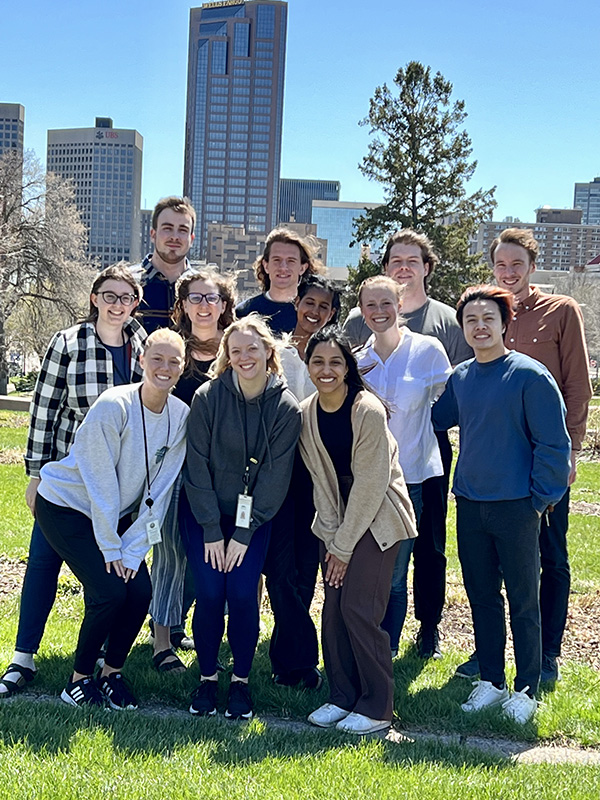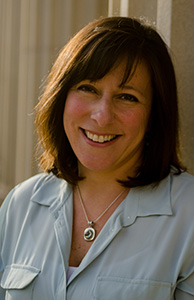Minnesota Department of Health (MDH) epidemiologists oversee a team of 8 to 10 interviewers (“Team Diarrhea”) who are part-time MDH employees hired from a pool of MPH students at the University of Minnesota, School of Public Health.
Each student works approximately 20 hours per week. Team Diarrhea’s hours of operation are Monday through Thursday, 9 a.m. to 8:30 p. m.; Friday, 9 a.m. to 5 p.m.; and Sunday 4 p.m. to 8 p.m. Scheduling night and weekend hours for interviewers increases the likelihood that cases will be able to be reached for interview.
Team Diarrhea was first formed in 1995. From 1999 through 2022, a total of 215 students have worked as part of Team Diarrhea.


TEAM DIARRHEA ACTIVITIES
ACTIVE SURVEILLANCE
Team Diarrhea is responsible for the collection of case data from health care providers.
- Reportable diseases rule requires reporting by health care provider AND submission of isolate/clinical materials to the Public Health Laboratory (PHL).
- Team Diarrhea students will look for report cards based on positive results at the PHL. If any (or all) data are missing, they will call the health care provider and/or clinical laboratory to get the information.
- Team Diarrhea students interview cases about their illness and exposures.
CLUSTER AND OUTBREAK INVESTIGATIONS
Team Diarrhea’s role includes:
- Interview cases and controls
- For WGS clusters: students may call cases back to ask additional questions (determined by lead epidemiologist investigator). Students are encouraged to review questionnaires of previous cluster cases before calling new cases.
- Data entry
- Data analysis (encouraged)
- Specimen collection kit drop-off/pick-up (state car available at all times)
- Look up phone numbers for names on reservations or credit cards
- Participate in conference calls
- Participate in unit meetings
DATA ENTRY, MANAGEMENT, AND ANALYSIS & SPECIAL PROJECTS
Team Diarrhea students are responsible for data collection and data entry for surveillance and outbreaks, and are able to work on special projects. Examples of activities include:
- Enter surveillance data into MEDSS
- Enter data from exposure interviews
- Enter data for special projects
- Participate in different aspects of special projects
FOODNET RESEARCH STUDIES
Team Diarrhea students play an important role in studies conducted in collaboration with FoodNet. Their responsibilities include:
- Interviewing cases, and recruiting and interviewing controls, for case-control studies of sporadic infection
- Perform other study-related duties as assigned (e.g., updating tracking spreadsheets)
- Data entry
- Participate in conference calls
INTEGRATIVE LEARNING EXPERIENCE AND APPLIED PRACTICE
Students can use their Team D experience to fulfill their applied practice requirement for their MPH degree, and many use MDH data for their MPH thesis projects.
- Out of 116 Team D students from the University of Minnesota School of Public Health, fifty-six (48%) completed their MPH thesis project using MDH data, and 41 (35%) received field experience credits for their work in Team Diarrhea.
- Students typically work with an epidemiologist as their project advisor. Several MDH epidemiologists have adjunct appointments at the U of M and can serve on student thesis committees.
ON THE JOB TRAINING
On the job training is provided to all Team D students:
- MDH new employee training
- Data practices and how it relates to HIPAA training done upon hiring
- Minnesota Electronic Disease Surveillance system (MEDSS) training
- Phone training for calling clinics is done by pairing with a current student.
- Interview training by epidemiologist, followed by shadowing an experienced student. Completed interviews are reviewed by epidemiologists and feedback is provided.
- Disease-specific training using reference materials, a summary “cheat sheet” and on-going feedback.
In addition to these activities, Team D students work on major public health emergencies investigated in the Infectious Disease Epidemiology, Prevention and Control Division as needed. They may help make phone calls or take calls from the public, they may staff hotlines, or they may pick up samples. Examples include: COVID-19, H1N1, and fungal meningitis.
QUESTIONS?
If you have questions regarding Team D or are interested in more information please contact Dr. Carlota Medus.
Dr. Medus has a MPH and PhD in epidemiology and environmental health from the University of Minnesota School of Public Health. She has been an epidemiologist at MDH and has supervised Team D since 1999.

Carlota Medus, MPH, PhD
MN Department of Health
651.201.5527
carlota.medus@state.mn.us

